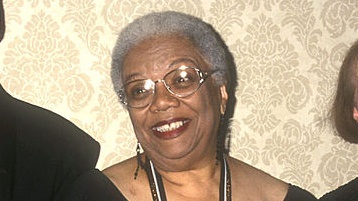Armed with the belief that a better life could only be accomplished by individuals accepting personal responsibility, Lucille Clifton revolutionized the power of positive affirmations. Born in Depew, New York, she received early encouragement from her mother, who was also a poet, to write her own compositions.
After leaving Howard University in 1955 to fully dedicate her profession to poetry, Clifton's first book, Good Times, was published in 1969. From there, she worked in various roles with the state and federal government until she was hired at Coppin State College in Baltimore, Maryland in 1971 to be a writer in residence. Clifton's finest Maryland acknowledgement was in 1979, when she became the second woman and the first Black person to be named as the state's Poet Laureate. She held this title until 1982.
She continued to publish many more compositions and poems throughout her adult years, venturing into children's literature at the tail end of her career. Clifton passed away in Baltimore on February 13, 2010.
There's no limit to the impact Clifton has when it comes to verse, but the the following five poems are just a glimpse into why she is regarded as one of the most gifted thinkers of our time.
1. The Lost Women
In this sonnet, Clifton honors the women whose voices or personalities often go unnoticed. Unlike men, women do not always have the luxury to band together so easily. So, she details the various activities she and her group of friends would be doing together if given the chance to be so publicly self-expressive.
2. Jasper Texas 1998
This poem is based on a tragic true story. Clifton dedicates “Jasper Texas 1998” to James Byrd, a Black man who died after he was dragged behind a pickup truck by his ankles for three miles by three white men in Jasper, Texas. Considering it was a racist attack, Clifton wonders why she should still refer to white men as “brother.” In the final stanza, Clifton writes that she is “done” with these senseless acts of violence against Black Americans, which is unfortunately something still being echoed today.
3. Homage to My Hips
The reader can think of “Homage to My Hips” as a love letter to a woman's body, a poem meant to be read with passion and fervor. The narrator advocates for women to love their bodies, regardless of size or what’s largely accepted in society. Clifton’s imagery is so poignant in this work, it’s impossible to draw any conclusion other than someone who is celebrating the many benefits of a specific part of her body — the hips. It’s a gentle, yet important reminder to women everywhere that no one is more in control of her body than she.
4. Here Rests
In "Here Rests," Clifton honors her late sister Josephine, who has been "dead these 15 years." Josephine was a sex worker, who returned home to care for their dying father. An avid reader, Josephine "carried a book / on every stroll," and her love of reading is emphasized throughout the composition. In the final stanza, Clifton specifies one final birthday wish for Josephine: may a literate gentleman in heaven respectfully court her unlike the men she was involved with during her time on earth.
5. Sorrow Song
Contained in the 1987 compilation Next: New Poems, "Sorrow Song" looks at the loss of lives at the expense of war, violence and unrest through a child's eyes. She references a concentration camp, a Japanese city bombed during World War II, the consequences of apartheid and other serious events to hone in on the poem's themes: the quest for power comes with unfortunate, often times deadly circumstances. Because they are still adolescents, children are able to see the world as a diverse, melting pot of culture. Unlike adults, who are only able to identify what separates them for their peers.
Though she never won a Pulitzer Prize for her contributions to poetry and prose, Lucille Clifton was nonetheless respected across various genres of American literature and her catalog of compositions still hold a considerable amount of relevancy today. She was intrepid in her assessment of racism, women's issues and class, acknowledging that a larger conversation of how society addressed those issues needed to be had.
